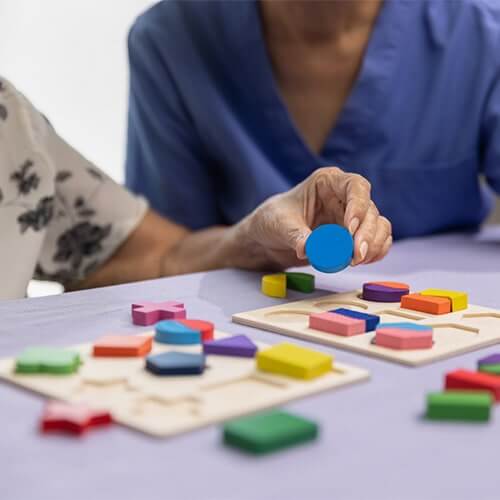Understanding Vascular Dementia

Vascular dementia is estimated to affect around 180,000 people in the UK, which equates to roughly 20% of dementia diagnoses that have a specified diagnosis. While not the most common type of dementia, these statistics show it is a prevalent health condition, so understanding the condition is important, from symptoms, causes and vascular dementia care.
Vascular dementia shares symptoms with other types of dementia, but it has unique characteristics and causes, meaning that care and treatments need to be tailored to these.
At LuxuryCare, we are dementia care experts. Each of our staff undergoes thorough training that comprehensively covers each type of dementia so our staff can look out for changes in symptoms and behaviour and effectively manage the condition so your loved one can live the best life possible.
In this blog, we share everything you need to know about the condition, explaining symptoms, causes and treatment.
What is Vascular Dementia? And What Are The Symptoms?
As you will already know, vascular dementia is a type of dementia. It is linked to the flow of blood to the brain and often follows a stroke.
Similar to other dementia types, the symptoms can develop suddenly. They also vary from each individual, which makes spotting them difficult.
Common symptoms include:
- Memory difficulties
- Struggles to plan
- Inability to reason
- Reduced concentration
- Mood changes
- Confusion
- Trouble walking and balancing


Causes of Vascular Dementia
Vascular dementia is usually caused by reduced blood flow to the brain and damage to the blood vessels. This can be caused by a few different things.
- Ischemic stroke – a blood clot blocks the blood flow and oxygen supply to the brain, leading to permanent damage. Multiple strokes or widespread damage can accelerate the onset of dementia.
- Mini-strokes – these are temporary blockages of blood flow in the brain, and while they don’t cause permanent brain damage, they can increase the risk of vascular dementia.
- Small vessel disease – this impacts the smaller vessels deep within the brain, with conditions such as hypertension, diabetes, and high cholesterol causing vessels to thicken, harden or become clogged with plaque, restricting blood flow to the brain.
- Vascular disease – the buildup of fatty deposits on artery walls, also known as atherosclerosis, can restrict blood flow to parts of the brain, increasing the risk of strokes and vascular dementia. Heart disease and arrhythmias also reduce the efficiency of blood flow to the brain.
- Chronic hypertension – consistent high pressure weakens the artery walls, making them more susceptible to rupturing or clogging, which can lead to larger strokes or ongoing vessel damage, elevating the risk of vascular dementia.
Stages of Vascular Dementia
Like all other forms of dementia, vascular dementia is a progressive disease, meaning there are several stages to it.
- Mild cognitive impairment – early signs of the disease are shown, such as subtle difficulties with memory or focus. Personality shifts and increased irritability.
- Mild to moderate vascular dementia – the symptoms become more noticeable with challenges in decision-making, language and spatial orientation. Mood swings and emotional instability become more prominent.
- Moderate to severe vascular dementia – significant decline in cognitive ability with pronounced memory issues and difficulty recognising family members and surroundings. Agitation and confusion continue, and some might start experiencing hallucinations or paranoia.
- Severe vascular dementia – unable to engage in conversation or comprehend instructions, extensive memory loss and inability to recognise surroundings or loved ones.
- End stage – minimal or absent communication and likely to be bedridden. No response to their environment or caregivers.


Management Strategies of Vascular Dementia
Unfortunately, vascular dementia doesn’t have a cure, so any treatment put in place is to manage symptoms so your loved one can enjoy a high quality of life.
In the early stages, lifestyle changes are likely to be recommended to slow the progression of the disease. For example, diet changes might be suggested to someone with high cholesterol to reduce atherosclerosis and the impact on dementia.
Of course, there are a number of medications that can be prescribed to help some cognitive function and underlying conditions that might be causing dementia, such as blood pressure tablets.
Additionally, there are several types of therapy that can be used and incorporated into a bespoke care plan to reduce the impact of some of the symptoms. For example:
- Physio and occupational therapy to help mobility
- Reminiscence therapy helps memory
- Music therapy to stimulate the brain
- Animal therapy to help regulate mood and emotions
- Garden therapy to help mobility, stimulate the brain and regulate emotions
The management of the disease will vary for each individual because they will need to target the unique symptoms experienced by your loved one.
Vascular Dementia Care At LuxuryCare
Vascular dementia is a type of dementia caused by restricted blood flow to the brain, which impairs cognitive abilities.
Symptoms vary but often include an inability to reason, memory issues, struggles to balance and walk, reduced concentration and mood changes.
Because the symptoms change for each person, the management and treatment need to be bespoke, but it will often include medication, some lifestyle changes and a combination of therapies to slow the progression of the disease down.
LuxuryCare are dementia care specialists with care homes across Bournemouth and Poole that have dedicated staff and facilities to help your loved one live the best quality of life possible.
Our activities programme incorporates a range of therapy types, such as gardening in our spacious gardens, music and animal therapy.
Each of our homes has been designed with dementia in mind, meaning our rooms and facilities are bright with visual signs and cues so that your loved one can easily navigate their way around the home independently. Each room door has the resident’s name, and the entrance has a memory box so they can identify their personal space.
We encourage all of our residents to personalise their rooms to make them feel comfortable but also to help them recognise their space.
We also create bespoke care plans for all of our residents so that the care they receive is tailored to their needs. Throughout our admissions process, we will complete a care needs assessment where we get to know your loved one’s medical and personal care needs, as well as their lifestyle and preferences. This is the start of our relationship with you and your loved one, and we use this to set the example of how we want to include everyone in the care we provide.
Discover our vascular dementia care today by visiting our care homes. Call us on 01202 037373 or complete our online contact form to book a viewing where we can discuss your loved ones’ needs and how we can cater to them while showing you the lifestyle at LuxuryCare.















